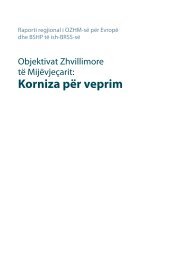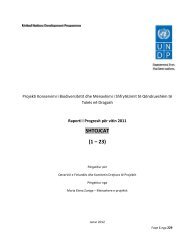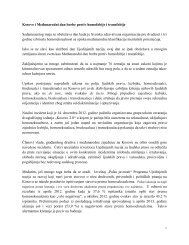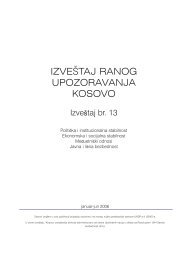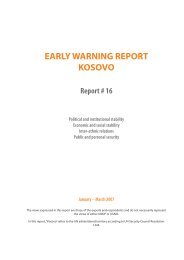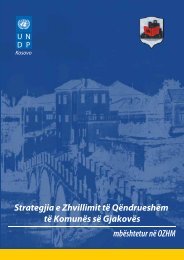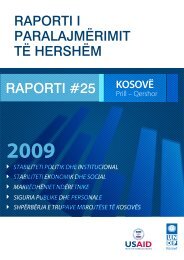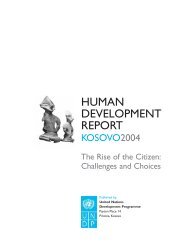Kosovo Human Development Report 2010 - UNDP Kosovo - United ...
Kosovo Human Development Report 2010 - UNDP Kosovo - United ...
Kosovo Human Development Report 2010 - UNDP Kosovo - United ...
Create successful ePaper yourself
Turn your PDF publications into a flip-book with our unique Google optimized e-Paper software.
Entrepreneurs in <strong>Kosovo</strong>’ report lists<br />
many obstacles that hinder women’s<br />
ability to start businesses and secure<br />
sustainable livelihoods. Based on this<br />
report, the majority of businesswomen<br />
respondents replied that the main<br />
obstacles to the growth of their business<br />
are family obligations and responsibilities.<br />
Furthermore, 20 percent of<br />
businesswomen stated that they had<br />
many difficulties in obtaining loans<br />
from banks in <strong>Kosovo</strong>, mainly due to<br />
Table<br />
2.7<br />
44 | KOSOVO HUMAN DEVELOPMENT REPORT <strong>2010</strong><br />
Key labour market indicators by gender (2004-2008)<br />
Source: Calculated from <strong>Kosovo</strong> Mosaic Survey, <strong>UNDP</strong> 2009<br />
high interest rates, short repayment<br />
periods and unavailability of loans for<br />
business start-ups. Businesswomen<br />
are also often unable to meet the requirement<br />
to provide property as collateral<br />
during loan applications. Most<br />
of <strong>Kosovo</strong> property is registered under<br />
the male names (husband, father, or<br />
brother) and only in very special cases<br />
(in female headed families) women<br />
own property in their own name. 57<br />
(ii) Groups excluded from basic<br />
goods and services (by location,<br />
education, ethnicity and access<br />
to public utilities): looking at the<br />
population subgroups, three characteristics<br />
stand out for raising<br />
the incidence of exclusion from<br />
the minimum acceptable level of<br />
goods and services: 1) living in rural<br />
areas and to a lesser extent in secondary<br />
cities; 2) having low levels<br />
of education; and 3) being a member<br />
of a <strong>Kosovo</strong>-RAE community<br />
and to a lesser extent a member of<br />
a <strong>Kosovo</strong>-Albanian family.<br />
Location: while the incidence of exclusion<br />
from factor markets was higher<br />
in urban areas, the incidence of exclusion<br />
from basic goods and services<br />
is much higher in rural areas. Consequently,<br />
residents of rural areas and secondary<br />
cities face a far greater risk of exclusion<br />
from basic goods and services<br />
2004 2006 2008<br />
Men Women Men Women Men Women<br />
Labour force participation rates 67.8% 25.2% 69.6% 30.6% 65.8% 26.1%<br />
Employment rates 46.4% 9.9% 46.1% 11.8% 37.7% 10.5%<br />
Unemployment rates 31.5% 60.7% 34.6% 61.6% 42.7% 59.6%<br />
in comparison with Prishtinë/Priština.<br />
From a regional perspective, the<br />
Prizren and Ferizaj/Uroševac regions<br />
had higher incidence of exclusion from<br />
basic goods and services compared<br />
to the average rate for all of <strong>Kosovo</strong><br />
whereas the Gjakovë/Gjakovica, Mitrovicë/Mitrovica<br />
and Pejë/Peć regions<br />
had the lowest incidence of exclusion<br />
from basic goods and services. At<br />
the municipal level Skenderaj/Srbica,<br />
Obiliq/Obilić, Gllogovc/Glogovac, and<br />
Malishevë/Malisevo had the highest incidence<br />
of exclusion from basic goods<br />
and services respectively with 43 percent,<br />
53 percent, 38 percent and 40 percent,<br />
while Leposaviq/Leposavić, Zubin<br />
Potok, Zveçan/Zvečan, Shtërpcë/Štrpce<br />
and Mamushë/Mamuša reported zero<br />
exclusion from basic goods and services.



